(完整版)上海牛津英语5B知识点汇总
- 格式:doc
- 大小:43.01 KB
- 文档页数:3
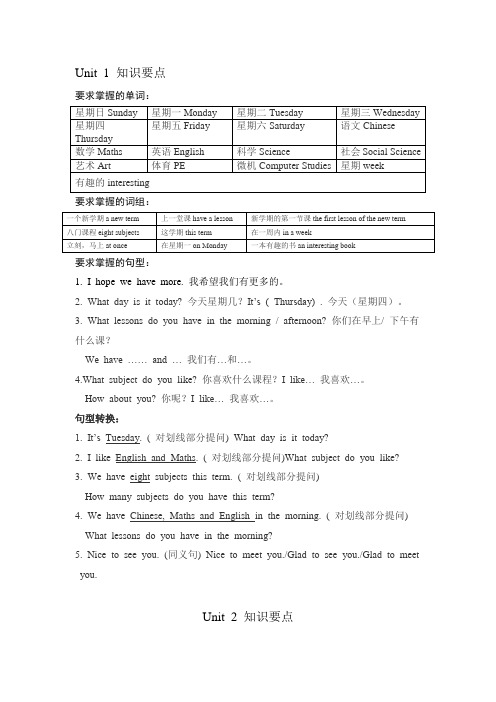
Unit 1 知识要点要求掌握的单词:要求掌握的词组:要求掌握的句型:1. I hope we have more. 我希望我们有更多的。
2. What day is it today? 今天星期几?It’s ( Thursday) . 今天(星期四)。
3. What lessons do you have in the morning / afternoon? 你们在早上/ 下午有什么课?We have …… and …我们有…和…。
4.What subject do you like? 你喜欢什么课程?I like…我喜欢…。
How about you? 你呢?I like…我喜欢…。
句型转换:1. It’s Tuesday. ( 对划线部分提问) What day is it today?2. I like English and Maths. ( 对划线部分提问)What subject do you like?3. We have eight subjects this term. ( 对划线部分提问)How many subjects do you have this term?4. We have Chinese, Maths and English in the morning. ( 对划线部分提问) What lessons do you have in the morning?5. Nice to see you. (同义句) Nice to meet you./Glad to see you./Glad to meet you.Unit 2 知识要点要求掌握的单词:要求掌握的词组:要求掌握的句型:1. Why are you absent today?你今天为什么缺席?(相当于Why are you not here today?)2. See you soon. 一会见。

新版英语5B单词归纳cap crayon socks umbrelladining room studydo exercise take a photo wear glassesdictionary magazine newspaper storybookrow a boat see a filmhotel island seafoodart room meeting room hall school gatesweater coat trousers shoeshave a cold have a fever have a headache have a toothache camera watchthe Spring Festival the Mid-Autumn Festivalthe Double Ninth FestivalLearn the soundsc ar bl ue sch oo l sk ir t p ur se L au ra fl oorb ee t ea d eer t ear f i ve p ieFl o g oa t J oe t oy n oi seh air Cl are b ear m ou se ow l M ay w ai t新版英语5B句型归纳Are they yours? Yes, they are.\ No, they aren’t.Why do you like it? Because it’s so big.I’ll be a teacher. I won’t wear glasses.I’m going to read a story every day.What are you going to do this weekend?Where will we stay?How long will we stay in Sanya?First, they’ll visit our classroom.Which dress do you like, the blue one or the pink one?You should take some medicine. You shouldn’t go to bed late. People can tell the time anywhere.The Spring Festival comes in January or February every year. What a mess! \Do you know why? \Don’t wait until tomorrow. It’s your size.\What’s wrong with yo u?\Let me have a look. Have a good rest and you’ll get well soon.What shall we do?Really?新版英语5B知识点总结1、let's tidy it up.Whose cap is this? It's mine.Whose socks are these? They are Paul's.Can you put it on his bed? Sure.Thank you for your help, Sally.You're welcome, Peter.Peter is tidying up the bedroom. Who is tidying up the bedroom? Jimmy sees a small box on the table. It's full of nails.All the nails fall on the floor.Jimmy's father gives him a black stone.2、Why do you like it? Because it's so big.Wild geese have busy lives. They fly from one place to another. They change homes twice every year.There is an old woman. She gives the children some bread, and then she says, it's time to go to bed.Do you like Nancy's home or Dan's home?Laura wants to buy a new skirt. The old one is too small.3、I'll be a teacher.I won't wear glasses.Kitty wants to know about her future. She stands in front of a magic machine and takes a photo.I am good at Maths, but I am weak in English.I do not like to get up early, so I have no time for breakfast. I’m often late for school. I do not like sport and I get tired easily. I like watching TV. In the future, I will study hard and I will read more English books. I will try to get up early and have breakfast.I will not be late for school any more. I will do exercise every day. I will not watch too much TV.4、I'm going to read a story every day.The students in Class5A are going to make posters about the best sto ries for children.The Lis are at the bookshop.5、What are you going to do this weekend?I'm going to stay at home and watch TV with my grandparents.I don't have any plans for the weekend.6、What are we going to do this summer?How do we get there? We get there by plane.Where will we stay? We’ll stay in a hotel by the sea.How long will we stay in Sanya? We’ll stay there for five days. What will we do there?Sanya has beautiful beaches with clear water. We’ll go swimming there. We’ll also have seafood. The seafood there tastes great.7、The Open Day is on 30th April. Ms Guo is asking the childrenabout the day.First,they’ll visit our classroom.Next, they’ll visit the art room.Then, they’ll go to the hall.Af ter that, they’ll go to the library.Finally, they’ll meet the teachers in the meeting room.Ms Guo takes the parents to the classroom. She tells them about the lessons.The children show their parents some beautiful pictures.They have tea and cakes with the teachers in the meeting room.In the UK, schools often have Parents’Evenings. It is a time for teachers and parents to talk.8、Which dress do you like, the blue one or the pink one?I like the pink one. You can try both on. I’ll try on the trousers.One day, a man visits him with some nice clothes.The emperor puts on the “new clothes〞and gives the man a lot of money.People keep quiet.9、You should take some medicine.You shouldn’t go to bed late.What’s wrong with you? I have a headache/have a cold.have a fever have a headache have a toothachehave a look have a good rest get wellWhat’s the date today?It’s the fifth of May.10、People can travel from one place to anther very fast.One day, they are watching some birds flying in the sky. They want to fly too.11、The Spring Festival comes in January or February every year. On Chinese New Year Eve, families have a bid dinner together. Children often get red packets with some money in them.People also watch fireworks at night.12、A giant lives in a big house with a beautiful garden.She does not bring any to the giant’s garden.They bring Miss Spring to his garden.The giant looks at his garden and feels sad.He’s not kind to children.The giant knocks down the wall around his garden. Miss Spring never comes late again.。

5B知识梳理单词词组主要句型和语法点1.介词:behind, beside, inside, on的用法2.to be 句型:肯定句,否定句,一般疑问句,特殊疑问句及其它们的回答1)Where is it /are they?2)Is it…?3)Whose …is this/are these?4)What time…?5)Whose are/is …?6)What colour …?7)Where’s it now?3.can的句型:肯定句,否定句,一般疑问句,特殊疑问句及其它们的回答1)Can you see? – Yes, I can. No, I can’t.2)What can…?3)…can’t….4.祈使句:8)Be careful/quiet!9)Draw …10)Put …5.形容词1)soft, fluffy, shiny, warm,2)new, small, big, loud, quiet,3)same, different,4)colours5)Seasons6)wet, sunny, cloudy, dry6.连词:and7.名词性的物主代词的用法:mine, yours, his, hers, theirs, ours,8.时间表达法:1)at … o’clock2)in the morning/afternoon3)five past/to one4)nine fifteen/ a quarter past nine9.指示和问路:How can I get to…/How can I get there?10.to do 句型:肯定句,否定句,一般疑问句,特殊疑问句及其它们的回答1)Do you want…?2)Which … do you like?11.have got句型:1)What have you got?2)Who has got…?12.both, all的用法both 两者都,all三者以上,后面所跟名词必须是复数,both rulersall the rulers13.一般过去时: 肯定句,否定句,一般疑问句,特殊疑问句及其它们的回答1)Where was Sam?He was….He wasn’t…Was he….? No, he wasn’t. Yes, he was.2)There was a cat.3)He cut the rice last year.He didn’t cut the rice….Did he cut the rice…..?Yes, he did. No, he didn’t.What did he cut last year?日常会话1.Sorry!2.Excuse me! Ok! You are welcome! Yes, it is. No, it isn’t3.Hello!4.I don’t know. Thank you very much!5.Good night!6.What time is it?。
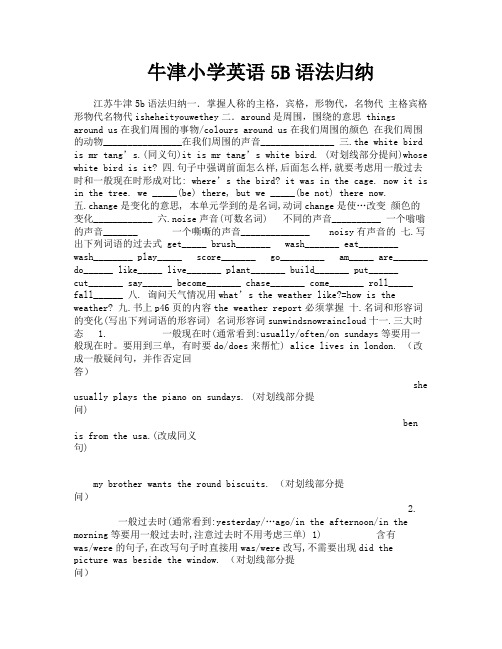
牛津小学英语5B语法归纳江苏牛津5b语法归纳一.掌握人称的主格,宾格,形物代,名物代主格宾格形物代名物代isheheityouwethey二.around是周围,围绕的意思 things around us在我们周围的事物/colours around us在我们周围的颜色在我们周围的动物________________在我们周围的声音_______________ 三.the white bird is mr tang’s.(同义句)it is mr tang’s white bird. (对划线部分提问)whose white bird is it? 四.句子中强调前面怎么样,后面怎么样,就要考虑用一般过去时和一般现在时形成对比: where’s the bird? it was in the cage. now it is in the tree. we _____(be) there, but we _____(be not) there now.五.change是变化的意思, 本单元学到的是名词,动词change是使…改变颜色的变化____________ 六.noise声音(可数名词) 不同的声音__________ 一个嗡嗡的声音_______ 一个嘶嘶的声音______________ noisy有声音的七.写出下列词语的过去式 get_____ brush_______ wash_______ eat________wash________ play_____ score_______ go_________ am_____ are_______ do______ like_____ live_______ plant_______ build_______ put______cut_______ say______ become_______ chase_______ come_______ roll_____ fall______ 八. 询问天气情况用what’s the weather like?=how is the weather? 九.书上p46页的内容the weather report必须掌握十.名词和形容词的变化(写出下列词语的形容词) 名词形容词sunwindsnowraincloud十一.三大时态 1. 一般现在时(通常看到:usually/often/on sundays等要用一般现在时。
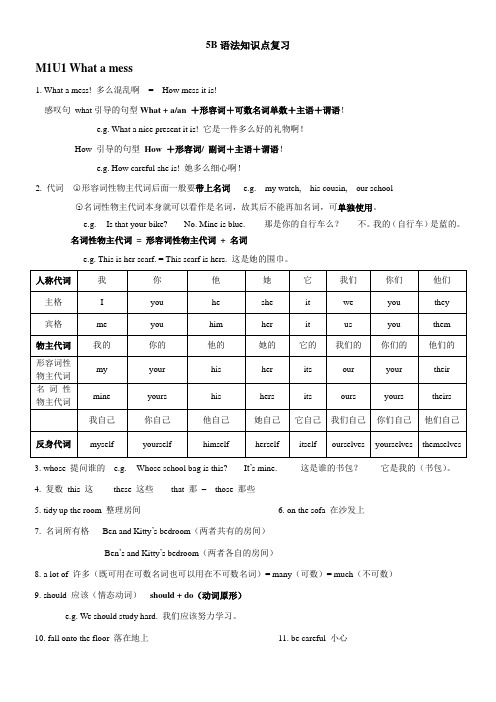
5B语法知识点复习M1U1 What a mess1. What a mess! 多么混乱啊= How mess it is!感叹句what引导的句型What + a/an +形容词+可数名词单数+主语+谓语!e.g. What a nice present it is! 它是一件多么好的礼物啊!How 引导的句型How +形容词/ 副词+主语+谓语!e.g. How careful she is! 她多么细心啊!2. 代词○1形容词性物主代词后面一般要带上名词 e.g. my watch, his cousin, our school○2名词性物主代词本身就可以看作是名词,故其后不能再加名词,可单独使用。
e.g. -- Is that your bike? -- No. Mine is blue. -- 那是你的自行车么?-- 不。
我的(自行车)是蓝的。
名词性物主代词= 形容词性物主代词+ 名词e.g. This is her scarf. = This scarf is hers. 这是她的围巾。
3. whose 提问谁的 e.g. -- Whose school bag is this? -- I t’s mine. -- 这是谁的书包?-- 它是我的(书包)。
4. 复数this 这- these 这些that 那–those 那些5. tidy up the room 整理房间6. on the sofa 在沙发上7. 名词所有格Ben and Kitty’s bedroom(两者共有的房间)Ben’s and Kitty’s bedroom(两者各自的房间)8. a lot of 许多(既可用在可数名词也可以用在不可数名词)= many(可数)= much(不可数)9. should 应该(情态动词)should + do(动词原形)e.g. We should study hard. 我们应该努力学习。
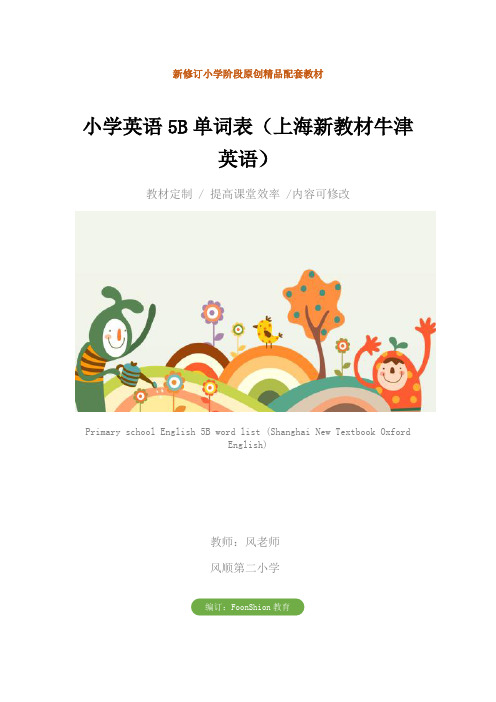
新修订小学阶段原创精品配套教材小学英语5B单词表(上海新教材牛津英语)教材定制 / 提高课堂效率 /内容可修改Primary school English 5B word list (Shanghai New Textbook OxfordEnglish)教师:风老师风顺第二小学编订:FoonShion教育小学英语5B单词表(上海新教材牛津英语)五年级第二学期牛津英语必背词汇表XX-2 班级____ 姓名____ 牛津页数中文英文中文英文p2一团糟what a mess! p12出生born名词性物主代词我的(东西)mine尾巴tail你的/你们的(东西)yours p14噪音,吵闹声nnoise他的(东西)his吵闹的adj noisy她的(东西)hers另一个another我们的(东西)ourshear的过去式heard他们的(东西)theirssit的过去式sat故事书storybook p15电钻drill p3笔记本notebook 卡车lorry画笔,毛笔brush公交车bus颜料paints小轿车car书包school bag 摩托车motorbike 蜡笔crayon电视television 胶水glue收音机胶带tape门铃doorbell放put p17流行乐队pop group p6工作坊workshop一点儿也不not at all. p7魔力的magic p18loud的最高级loudest磁铁magnet响亮的,大声的adj loud钉子响亮地,大声地adv loudly p8有趣的interesting p19安静的adjquiet昆虫insect安静地advquietly茧cocoon p20可乐cola生长grow健康的adjhealthyam/is的过去式was重要的adjimportantare的过去式weredo的过去式did p9毛毛虫caterpillar远离keep…away蝴蝶butterfly p21肉meat小鸡chick xk b1.c om 猪肉pork鸡chicken牛肉beef小鸭duckling鸡肉chicken鸭duck鱼肉fish小狗puppy水果fruit狗dog蔬菜vegetable p10蚕silkworm番茄tomato土豆potato p33到了上语文课的时间。

牛津沪教版小学英语五年级下册知识点总结沪教版五年级英语下册(上海牛津5B)知识点总结知识点总结动词的形式:一、动词后面加上ing :①、现在进行时:表示某个动作正在发生或进行。
它的构成方式是:主语+be+动词ing〔现在分词〕形式,有时会要求自己加上be动词(is, am , are )。
句子中经常会出现look, listen,now 等词。
现在进行时的变化肯定句式:主语+be( am, is, are)+ 动词ing+其它.否定句式:主语+be(am, is, are) + not +动词ing+其它.一般疑问句:Be(am, is, are) + 主语+动词ing +其它?特殊疑问句:疑问词(what , where…)+be(am, is, are)+ 主语+动词ing +其它?对现在进行时的特殊疑问句的回答,它不可以用Yes或No直接作答,要根据实际情况回答。
练习:1. What are you ______________ (do)now? I ___________ (eat) bread.2. It ' s nine o ' cloc*.father ________________ (work) in the office.3. Look, the boy __________ (put) the plate on his fin ger.4. _________ he _________ (clea n) the classroom? No, heisn ' t.He ___________ (play).5. Where is Mak? He __________ (run) on the grass.6. Liste n, who _________ (sing) in the music room? Oh,Mary __________ (si ng)there.②like(s), go ,do some , 后面的动词加ing.如:1.1 like (play ) football, but my father likes (play) chess.2. ____________ Let ' s go wim).二、动词后面加s/es.这就有关一种时态:一般现在时。
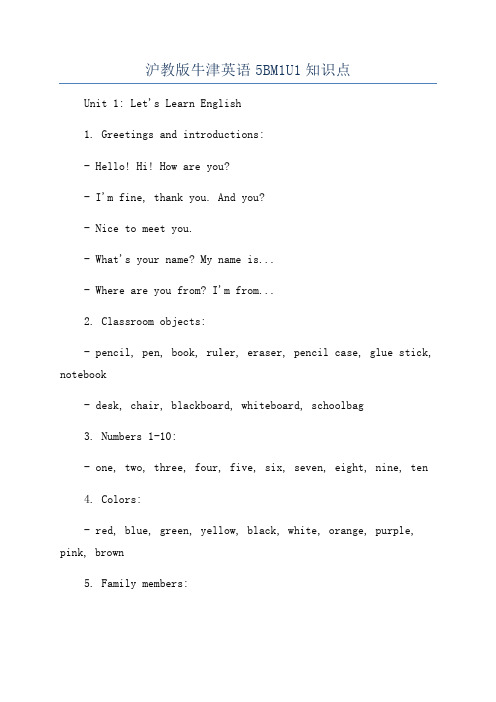
沪教版牛津英语5BM1U1知识点Unit 1: Let's Learn English1. Greetings and introductions:- Hello! Hi! How are you?- I'm fine, thank you. And you?- Nice to meet you.- What's your name? My name is...- Where are you from? I'm from...2. Classroom objects:- pencil, pen, book, ruler, eraser, pencil case, glue stick, notebook- desk, chair, blackboard, whiteboard, schoolbag3. Numbers 1-10:- one, two, three, four, five, six, seven, eight, nine, ten4. Colors:- red, blue, green, yellow, black, white, orange, purple, pink, brown5. Family members:- grandfather, grandmother, father, mother, brother, sister, baby6. Pronouns:- I, you, he, she, it, we, they7. Possessive pronouns:- my, your, his, her, its, our, their8. Animals:- dog, cat, fish, bird, rabbit, turtle, monkey, lion, elephant, giraffe, tiger9. Places:- home, school, park, supermarket, zoo, library, bank10. Prepositions of place:- in, on, under, behind, in front of, between, next to11. Verb "to be":- I am, you are, he/she/it is, we are, they are- get up, have breakfast, go to school, have lunch, do homework, go to bed- morning, afternoon, evening, night13. Days of the week:- Monday, Tuesday, Wednesday, Thursday, Friday, Saturday, Sunday14. Weather:- sunny, rainy, cloudy, windy, snowy15. Seasons:- spring, summer, autumn/fall, winter16. Clothes:- T-shirt, dress, shorts, skirt, pants, socks, shoes, hat, jacket17. Food and drinks:- apple, banana, orange, milk, water, juice, bread, rice, noodles, pizza18. Things in the kitchen:- stove, oven, refrigerator, sink, table, chair, cupboard19. Transport:- car, bus, bike, train, airplane, boat20. Sports:- tennis, soccer/football, basketball, swimming, cycling, running21. Hobbies and activities:- reading, drawing, playing music, watching TV, playing games22. Emotions:- happy, sad, angry, tired, scared, excited, bored23. Adjectives:- big, small, tall, short, long, fast, slow, beautiful, ugly, smart24. Opposites:- up/down, left/right, in/out, hot/cold, big/small,happy/sad25. Questions and responses:- What...? Where...? When...? Who...? How...?- It's... I'm... He's... She's... They're...- Listen, repeat, open your books, close your books, stand up, sit down27. Days of the week, months, and dates:- first, second, third, fourth, fifth, sixth, seventh, eighth, ninth, tenth- January, February, March, April, May, June, July, August, September, October, November, December28. Money:- yuan, dollar, euro, cent29. Musical instruments:- piano, guitar, violin, drums, flute30. Jobs:- teacher, doctor, nurse, firefighter, police officer, chef, musicianThese are the key points covered in Unit 1 of the Shanghai Oxford English 5B textbook.。
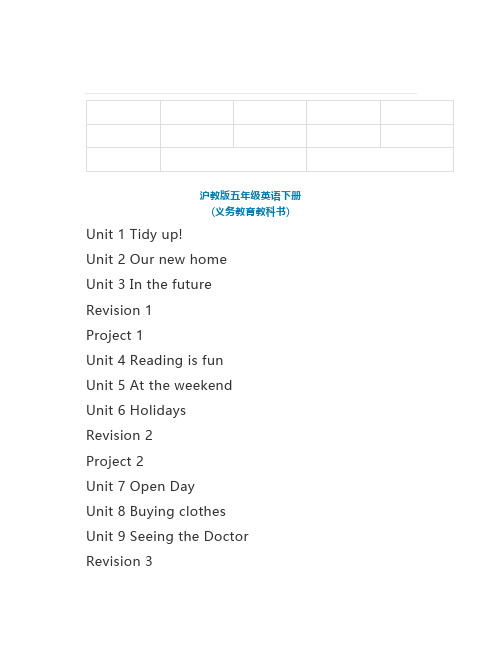
沪教版五年级英语下册(义务教育教科书) Unit 1 Tidy up!Unit 2 Our new homeUnit 3 In the futureRevision 1Project 1Unit 4 Reading is funUnit 5 At the weekendUnit 6 HolidaysRevision 2Project 2Unit 7 Open DayUnit 8 Buying clothesUnit 9 Seeing the Doctor Revision 3Project 3Unit 10 Great inventionsUnit 11 Chinese festivalsUnit 12 The giant‘s gardenProject 4知识点总结动词的形式:一、动词后面加上ing :①、现在进行时:表示某个动作正在发生或进行。
它的构成方式是:主语+be+动词ing〔现在分词〕形式,有时会要求自己加上be动词(is, am , are )。
句子中经常会出现look, listen,now……等词。
现在进行时的变化肯定句式:主语+be( am, is, are)+动词ing+其它.否定句式:主语+be(am, is, are) +not +动词ing+其它. 一般疑问句:Be(am, is, are) +主语+动词ing +其它?特殊疑问句:疑问词(what , where…)+be(am, is, are)+主语+动词ing +其它?对现在进行时的特殊疑问句的回答,它不可以用Yes或No直接作答,要根据实际情况回答。
练习:1. What are you _________(do)now? I___________(eat) bread.2. It’s nine o’clock.. Myfather_______________(work) in the office.3. Look, the boy____________(put) the plate on his finger.4. __________he__________(clean) the classroom? No, he isn’t.He____________(p lay).5. Where is Mak? He___________(run) on the grass.6. Listen, who___________(sing) in the music room? Oh, Mary___________(sing)there.②like(s), go ,do some , 后面的动词加ing.如:1. I like (play ) football, but my father likes (play) chess.2.Let’s go (swim).二、动词后面加s/es. 这就有关一种时态:一般现在时。
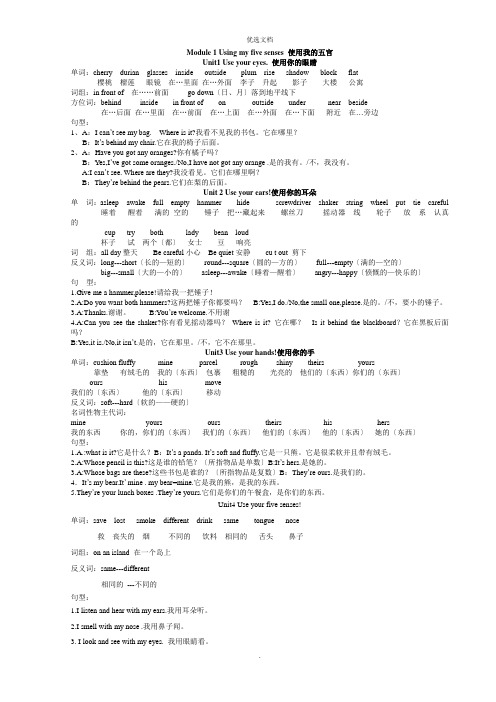
Module 1 Using my five senses 使用我的五官Unit1 Use your eyes. 使用你的眼睛单词:cherry durian glasses inside outside plum rise shadow block flat樱桃榴莲眼镜在…里面在…外面李子升起影子大楼公寓词组:in front of 在……前面go down〔日、月〕落到地平线下方位词:behind inside in front of on outside under near beside在…后面在…里面在…前面在…上面在…外面在…下面附近在…旁边句型:1、A:I can’t see my bag. Where is it?我看不见我的书包。
它在哪里?B:It’s behind my chair.它在我的椅子后面。
2、A:Have you got any oranges?你有橘子吗?B:Yes,I’ve got some oranges./No,I have not got any orange .是的我有。
/不,我没有。
A:I can’t see. Where are they?我没看见。
它们在哪里啊?B:They’re behind the pears.它们在梨的后面。
Unit 2 Use your ears!使用你的耳朵单词:asleep awake full empty hammer hide screwdriver shaker string wheel put tie careful 睡着醒着满的空的锤子把…藏起来螺丝刀摇动器线轮子放系认真的cup try both lady bean loud杯子试两个〔都〕女士豆响亮词组:all day整天Be careful小心Be quiet安静cu t out 剪下反义词:long---short〔长的—短的〕round---square〔圆的—方的〕full---empty〔满的—空的〕big---small〔大的—小的〕asleep---awake〔睡着—醒着〕angry---happy〔愤慨的—快乐的〕句型:1.Give me a hammer,please!请给我一把锤子!2.A:Do you want both hammers?这两把锤子你都要吗?B:Yes,I do./No,the small one,please.是的。
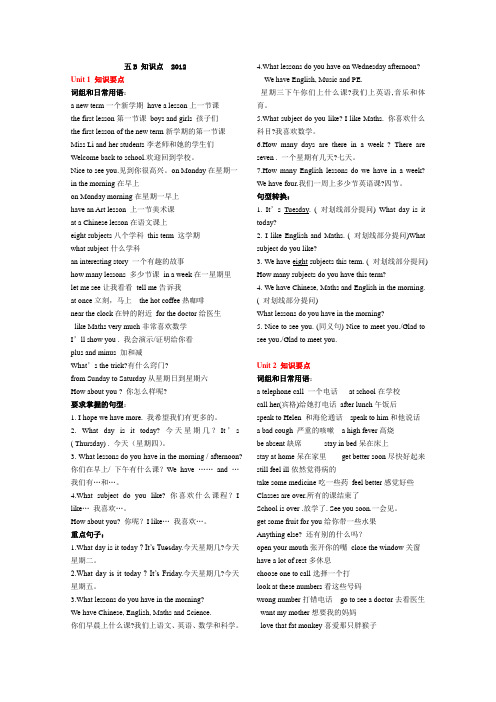
五B 知识点 2012Unit 1 知识要点词组和日常用语:a new term一个新学期have a lesson上一节课the first lesson第一节课boys and girls 孩子们the first lesson of the new term新学期的第一节课Miss Li and her students李老师和她的学生们Welcome back to school.欢迎回到学校。
Nice to see you.见到你很高兴。
on Monday在星期一in the morning在早上on Monday morning在星期一早上have an Art lesson 上一节美术课at a Chinese lesson在语文课上eight subjects八个学科this term 这学期what subject什么学科an interesting story 一个有趣的故事how many lessons 多少节课in a week在一星期里let me see让我看看tell me告诉我at once立刻,马上the hot coffee热咖啡near the clock在钟的附近for the doctor给医生like Maths very much非常喜欢数学I’ll show you . 我会演示/证明给你看plus and minus 加和减What’s the trick?有什么窍门?from Sunday to Saturday从星期日到星期六How about you ? 你怎么样呢?要求掌握的句型:1. I hope we have more. 我希望我们有更多的。
2. What day is it today? 今天星期几?It’s ( Thursday) . 今天(星期四)。
3. What lessons do you have in the morning / afternoon? 你们在早上/ 下午有什么课?We have ……and …我们有…和…。

牛津英语5B知识点总结Unit 1 A new term一、词汇:A.单词:1.week星期 Monday、Tuesday、Wednesday、Thursday、Friday、Saturday、Sunday2.subject学科 Chinese、English、Computer Studies、PE,Art、Maths,Music 、Science科学、Social Science社会minus减去,well哎呀,tell告诉,trick窍门,interesting 有趣的B.词组:1.have a lesson上课2. have a/an … lesson上一节…课3. nice to see you见到你真高兴4.in a week在一星期里5. on Monday morning/afternoon/evening 在周一上午/下午/晚上6. let me see让我看看/想想7.two weeks两星期8.every day/week/Monday每天/每星期/每周一9. this week/term这个星期/这个学期10.in the morning/afternoon/evening在上午/下午/晚上11.welcome to our school/class欢迎来我们学校/班级12.welcome back to school/class欢迎回到学校/班级13.the first lesson of the new term新学期的第一节课14.at once立刻 15.how about 怎么样16.tell me/us/you/him/her/them告诉我/我们/你/他/她/他们17.an interesting …一个有趣的…二、句子:1.---- What day is it today? ----It’s …2.----What lessons do you/they have (in the …)?----I/We/They have … and …3.----What lessons does he/she have (in the …)?----He/She has …and…4.----What subject do you/they like? ----I/We/They like…----What subject does he/she like? ----He/She likes ….5.----What subjects do you/they study at school? ----I/We/They study …6.----What subjects does he/she study at school? ----He/She studies …7.We have eight subjects this term.Wha t are they?They are …这学期我们有八门学科。
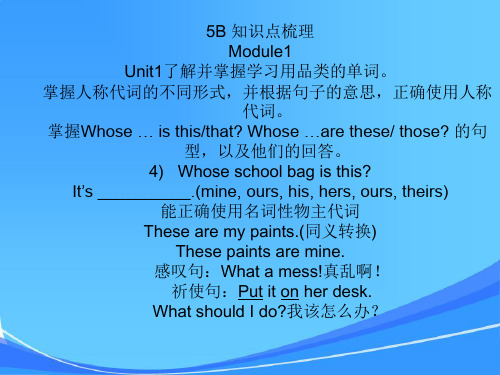

沪教版小学牛津英语五年极第二学期5B 动词过去式分析讲解全动词过去式:表示一般过去时态的动词通常用动词的过去式形式来表示,而动司的过去式是在动词原形的基础上变化的。
动词的过去式可分为规则动词和不规则动词。
一、规则动词的过去式变化如下:(1)一般情况下,动词词尾加ed,如:work—worked; play—played;want—wanted; enjoy-enjoyed(2)以不发音的e结尾动词,动词词尾加d,如:live—lived;move—moved;decide--decided;hope—hoped;(3)以辅音字母+y结尾的动词,把y变为i再加ed,如:study-studied, try-tried, cry― cried;(4)以一个辅音字母结尾的重读闭音节动词,双写词尾辅音字母,再加ed,如:stop-stopped, drop-dropped;以上(1)- (4)条的发音有所不同,分别是/d/,/t/或/id/。
二、不规则动词的过去式:不规则动词的变化规律性不强,须多加记忆。
(1)AAA型(动词原形、过去式、过去分词同形)cut(剪)一cut, hurt(伤害)一hurt, let(让)一let,put(放)一put, shut(关)一shut, read (读)/ri:d/—read/red/; (2)ABA型(动词原形与过去分词同形,不过我们现在不讨论过去分词)become(变化)--became, come(来)一 came, run(跑)—ran;(3)ABB型(过去式与过去分词同形)dig(挖)一dug, get (得到)—got, lay (产卵)—laid, shine(照耀)一shone, sit (坐)一sat, win (赢)一 won, meet(遇见)一met, keep(保持)一kept, sleep (睡觉:)一slept, sweep(扫地)一swept, feel(感觉)—felt, hold(抓住)-held, smell(闻)一smelt, leave(离开)一left, build(建造)—built, learn(学习)一learnt, mean(意指)—meant, catch(抓住)一 caught teach(教)—taught, bring(带来)一brought, fight(战斗)—fought, buy(买)一bought, think(想,认为)--thought, hear(听见)--heard, sell(卖)一sold, tell(告诉)--told, say(说)--saidfind(发现)—found, feed(喂养)—fed, have/has(有)—had, make(制作)一made, stand(站立)一stood, stick(黏贴)一stuck, (4)ABC型(动词原形、过去式、过去分词三者都不同形)begin(开始)—began, drink(喝)一drank, hide (躲藏)—hid, ring(打铃)—rang, swim (游泳)—swam, blow (吹)一blew, fly(飞)一flew, sing (唱)—sang, draw (画)一drew, grow(生长)一grew, know (知道)一knew, throw (扔)一threw, show(展示)一showed, forget (忘记)—forgot, speak (讲话)—spoke, wake(醒)一woke, drive (驾驶)一drove, eat (吃)一ate,fall(落下)—fell, give (给)一gave, rise (上升)—rose, take(拿走)—took, ride(骑)--rode, write (写)一wrote, do(做)一did, go(去)--went, see (看见)一saw, wear (穿)一wore, be(am,is, are)(是)--was, were。
上海牛津英语五年级下册语法点整理
动词的形式:
一、动词后面加上ing :
①、现在进行时:表示某个动作正在发生或进行。
它的构成方式是:主语+be+动词ing 〔现在分词〕形式,有时会要求自己加上be动词(is, am , are )。
句子中经常会出现look, listen, now……等词。
现在进行时的变化
肯定句式:主语+be( am, is, are)+动词ing+其它.
否定句式:主语+be(am, is, are) +not +动词ing+其它.
一般疑问句:Be(am, is, are) +主语+动词ing +其它?
特殊疑问句:疑问词(what , where…)+be(am, is, are)+主语+动词ing +其它?对现在进行时的特殊疑问句的回答,它不可以用Yes或No直接作答,要根据实际情况回答。
练习:1. What are you _________(do) now? I ___________(eat) bread.
2. It’s nine o’clock.. My father_______________(work) in the office.
3. Look, the boy____________(put) the plate on his finger.
4. __________he__________(clean) the classroom? No, he isn’t. He____________(play).
5. Where is Mak? He___________(run) on the grass.
6. Listen, who___________(sing) in the music room? Oh, Mary___________(sing) there.
②like(s), go , do some , 后面的动词加ing.
如:1. I like (play ) football, but my father likes (play) chess.
2.Let’s go (swim).
二、动词后面加s/es. 这就有关一种时态:一般现在时。
一般现在时:表示经常性的事情。
时间状语:often经常, usually通常, always总是,every每个, sometimes有时,at…在几点钟
它的动词变化与主语人称有关,只有肯定句中第三人称单数用动词三单(动词加s/es),其余动词均用原形。
在否定句和问句中,因为有助动词do, don’t , does , doesn’t,所以后面的动词用原形。
三单变化:多数在动词后加s play—plays like—likes
以s,x,sh,ch,o结尾的动词加es go—goes wash—washes watch--watches
以辅音字母加y结尾,把y改i再加es fly—flies study—studies
一般现在时的变化:
1、肯定句:主语(非三单)+动原+其它/ 主语(he , she )+动词三单+其它。
2、否定句:主语(非三单)+don’t+动原+其它/ 主语(he , she )+动原+其它。
3、一般疑问句:Do +主语(非三单)+动原+其它/ Does +主语(he, she )+动原+其它。
4、特殊疑问句:特殊疑问词(What, Where …)+do +主语(非三单)+动原+其它
特殊疑问词(What, Where…)+ does +主语(he , she )+动原+其它。
练习:1. We often___________(play) in the playgound.
2. He _________(get) up at six o’clock.
3. __________you _________(brush) your teeth every morning?
4. What (do) he usually (do) after school?
5. Danny (study) English,Chinese,Maths,Science and Art at school.
6. Mike sometimes __________(go) to the park with his sister.
7. At eight at night, she __________(watch) TV with his parents.
8. ________ Mike________(read) English every day?
9. How many lessons_________your classmate________(have) on Monday?
10. What time_________his mother_________(do) the housework?
11. What you usually (do ) on Sundays ?
12. He ( not like ) ( drink ) tea .
13. They (not like ) ( play ) cards.
三、动词用原形的名显特征有:1、在can , can’t, let’s , shall we 后面用原形。
2、助动词do , don’t , does , doesn’t 后面动词用原形。
练习:1、He can ( put ) an egg on his mouth .
2. Let’s ( clean ) the library now.
3. Shall we (have ) lunch at eleven o’clock?
4. Does your uncle (water) flowers every day ?
总练习:用所给动词的适当形式填空:
1. Wang Bing is (write) an e-mail to his friend in the study.
2. I (play) the piano, my brother (watch) TV now.
3.He can (swim), but I (not),I can (ski).
4.Let’s (go) and (play) basketball .
5.Shall we (clean) the classroom now.
6.I (like) (skate),my parents (not),they (like) (swim).
7.Miss Green (like) (dance) very much.
8. (do) Uncle Wang (run) fast?
9.GaoShan often (go) (swim) in Summer(夏天).
10.Do you (have) (some) (bobby)? Yes, I (do).
11 (do) your father (watch) TV in the evening?No, he (not).
12.This is Helen (speak).
13.Tom usually (play) football after school.
14.He (live) in a small town near Nanjing.
15.Pingping (write) an e-mail to his friend now.
16.What (do) Nancy usually (do)? She usually (grow) flowers .
17. My father ___ __(like) that song very much. He often ___ __(sing) it.
18. ________he ________(watch) TV in the evening? No, he ________
19. My parents usually________(get) up at 6. My sister _______(get) up at 6:15, and I usually _________(get) up at 6:30
20. _______your father _______(fly) kites over there now? Let me see. Yes, he ______. He often ________(fly) kites there. Shall we ______(go) to have a look?
21. My aunt (not like ) ( cook ).。